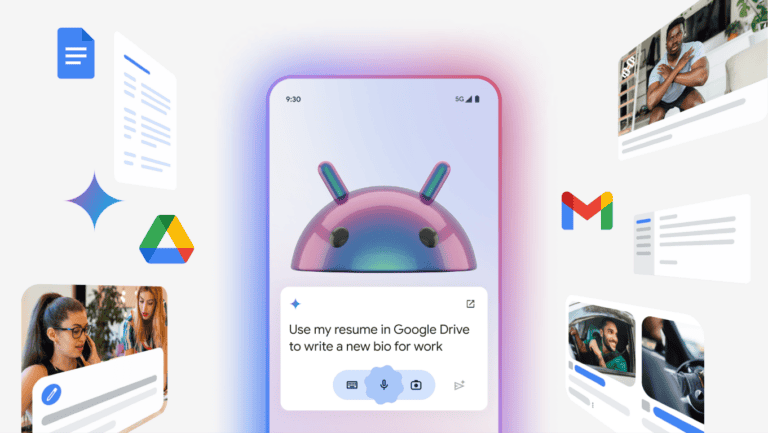Android users get an insight into Google’s AI plans for the operating system. These are entirely focused on integrating Gemini, Google’s own family of AI models. There seem to be no plans for an external partnership as with Apple and iOS.
Google wants to bring Gemini to as many users as possible. A logical market to reach consumers is with its search engine, where Google has the most dominant position over the competition. Where much ground can still be gained is in Android phones. To that end, the company today announces how Gemini is taking shape on Android.
Assistant redesigned
The first change Android users will notice seems to be the redesigned assistant. According to Sameer Samat, President of the Android Ecosystem, the changes can hardly escape the eye of the user. “We have completely rebuilt the assistant experience with Gemini so that you can talk to it naturally as you would talk to another person. It can understand intentions, follow your train of thought and perform complex tasks.”
So what does it do? The assistant is not a closed application but can assist across other apps. For example, the assistant can help search for information in your photos. So, when you get documents for your upcoming vacation in the mail, it might be helpful to take screenshots of them so Gemini can later look up the code for the apartment in your photos.
The revamped experience is available immediately through the Gemini mobile app. The app can understand 45 languages and has been available in Europe since June. In the coming weeks, the technology will also be added to the assistant feature in Android phones, which is available via the command ‘Hey Google’. The rollout will take place in all regions where the Gemini app is available.
Talking assistant
Users with a Gemini Advanced subscription will have even more opportunities to interact with the assistant. Through Gemini Live, they can talk to the AI assistant. According to the company, it is possible to discuss different topics in one interaction without confusing the AI assistant.
The functionality is immediately available in English. In the coming weeks, the number of languages in which assistance can be provided will be expanded. With the purchase of a Pixel Pro variant, Google will donate this subscription for the first year. Support for iOS will be added in the coming weeks.
Functionality dependent on data access
In terms of privacy, Google will become the guardian of your personal data. The AI assistant will send data to Google to process queries, but the company says the data will not be shared with third parties. Users must give the app permission before it can interact and pull data from other apps. After that, Gemini can answer your questions about upcoming appointments from your calendar, for example.
Moreover, the latest generation of Pixel phones can let Gemini perform small tasks entirely on the device due to the new Tensor G4 chip. This follows the example of Apple, which previously revealed its AI plans for Apple devices, including iPhones. With Apple Intelligence, Apple’s AI tool, the company also likes to play into the privacy aspect, as a lot of tasks can be performed locally on an iPhone. Samsung has another approach and runs Galaxy AI largely in the cloud and performs very little on-device. The performer of these tasks for Android is Gemini Nano. This is the smallest model in the Gemini family and requires only limited computing power.
Data access, however, does determine the quality of AI output. Google already had a bad experience with this obstacle when it integrated AI into the search engine. The tool then provided questionable and potentially dangerous answers to user queries for which few search results exist. A very famous example from this story is the recommendation of glue on pizza after a user wondered how to make cheese stick properly to the dough.
Also read: Bing Generative Search is Microsoft’s variant of Google’s AI search engine – Techzine Global
On an Android phone, for example, Gemini can help you plan an event. For example, if you come across a banner for an event, Gemini can check to see if you are still free on that date and pre-register the appointment in your work calendar. Then, it is possible to have Gemini send a text message to your spouse about your upcoming business trip. To make all that possible, the app will need access to both the email app and all the contacts on the phone.
Creating new habit
Moreover, it seems to be a functionality that users need to get used to. Smartphone users have been searching the calendar app themselves for years to see if a particular date is still free. As a result, it may feel unnatural at first to depend on Gemini for this purpose. Our review of the Google Pixel phone that will follow later on, should reveal how natural or unnatural it is to use Gemini.
Availability
Google also announced its latest Pixel phones today. For the ninth series, the Tensor G4 chip was developed. This generation was thought out to support Gemini functionalities. In terms of performance, Gemini can generate 45 tokens per second, the company said.
In addition, the Gemini app is available on hundreds of smartphone models from other brands. Support is also available for special designs such as Samsung’s Galaxy Z Fold 6 and Motorola’s Razr+. Google also launched its own foldable, on which it naturally wants to offer the Gemini experience as well.
